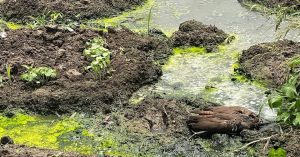Gambiaj.com – (GUNJUR, The Gambia) – The sudden death of at least 23 critically endangered hooded vultures in the heart of Gunjur has sparked renewed environmental concerns and suspicions of poisoning, with conservationists warning of a worsening ecological crisis linked to industrial pollution in the coastal town.
On July 3, 2025, the West African Bird Study Association (WABSA) was alerted by a local resident, about the disturbing sight of dead vultures scattered across the town center around 11 a.m.
Responding swiftly, WABSA’s head of research, Fagimba Camara, and field researcher Awa, accompanied by the local whistleblower, inspected the site. They found 23 hooded vultures dead and another in a visibly weakened state.
Samples were immediately collected for laboratory analysis. While investigations are still ongoing, WABSA says poisoning is strongly suspected.
“This is deeply concerning,” said a WABSA official. “We are committed to determining the exact cause and will take necessary action once we have the lab results.”
Mounting Evidence of Industrial Pollution
This latest incident comes just weeks after Ahmed Manjang, a prominent microbiologist and environmental activist from Gunjur, raised alarms about pollution from the Chinese-owned fishmeal factory operating near the town.
In May, Manjang posted on social media warning that toxic discharges from the factory, along with waste from a nearby ice plant, may have contaminated water wells in women’s vegetable gardens – the same area linked to previous mass bird deaths.

Manjang warned that serious pollution of a critical stream behind a Chinese fish meal factory in Gunjur killed a number of birds, including critically endangered hooded vultures.
“We strongly urge the National Environment Agency to immediately visit the site, conduct a thorough investigation, and take swift, decisive action to prevent further ecological damage,” Manjang wrote.
He stressed that the polluted wells are likely a water source for the hooded vultures, pointing to “toxic liquid waste” as the probable cause of the poisoning.
“This is not just about wildlife,” Manjang emphasized. “It’s a public health emergency, an environmental injustice, and a blow to the community’s livelihood and rights.”
A Recurring Tragedy
This is not the first time Gunjur has been the scene of such ecological devastation. In 2020, at least 36 hooded vultures were found dead near the town’s abattoir.
The deaths were then attributed to suspected poisoning, and conservationists warned that Gunjur was becoming a hotspot for such incidents.
Since then, tensions between the fishmeal factory and the local community have simmered, with residents blaming the plant for pollution of water sources and marine life destruction.
The hooded vulture (Necrosyrtes monachus) is listed as critically endangered by the International Union for Conservation of Nature (IUCN), making its protection a matter of urgent global concern.
Growing Pressure on Authorities
Environmental groups are now stepping up pressure on Gambian authorities to intervene decisively. Activists say continued inaction risks turning Gunjur into a case study of ecological collapse driven by industrial pollution and poor regulation.
“The pattern is clear, and the authorities cannot plead ignorance any longer,” one conservationist noted. “The government must enforce environmental laws, shut down polluters, and restore the community’s rights to safe water and a healthy environment.”
As WABSA awaits lab results, residents of Gunjur watch anxiously, fearing that the town’s long-standing environmental struggles are once again exacting a deadly toll – on wildlife, on livelihoods, and potentially on human health.










